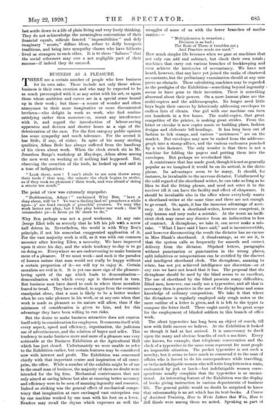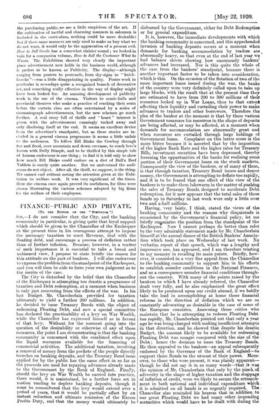BUSINESS AS A PLEASURE.
THERE are a certain number of people who love business for its own sake. These include not only those whose business is their own creation and who may be expected to be
as much preoccupied with it as any artist with his art, or again those whose ambition and career are in a special sense bound up in their work ; but those—a source of wonder and often annoyance to their more imaginative or more discontented brethren—who delight in work as work, who find routine satisfying rather than monotonous, resent any interference with it and regard the introduction of labour-saving apparatus and devices and shorter hours as a sign of the deterioration of the race. For the first category public opinion has some sympathy and much tolerance. For the second it has little, if any, of either. In spite of his many sterling qualities, Adam Bede has always suffered from the handicap of his views about work. When the clock struck six in Mr. Jonathan Burge's workshop at Hayslope, Adam alone among the men went on working as if nothing had happened. But, observing the cessation of the tools, he looked up and said in a tone of indignation :
" Look there, now ! I can't abide to see men throw away their tools i' that way, the minute the clock begins to strike, as if they took no pleasure i' their work, and was afraid o' doing a stroke too much."
The point of view was extremely unpopular.
" Bodderation, Adam ! " exclaimed Wiry Ben, " lave a chap aloon, will 'ee ? Ye war a-finding faul wi' preachers a while agoo—y' are fond enough o' preachin' yourson. Ye may like work better nor play, but I like play better nor work ; that'll :onamodate ye—it laves ye th' more to do."
Wiry Ben perhaps was not a good workman. At any rate 0eorge Eliot tells us severely that he left his job with a screw half driven in. Nevertheless, the world is with Wiry Ben's
principle, if not his somewhat exaggerated application of it. For the vast majority work is still, as it was with our common ancestor after leaving Eden, a necessity. We have improved upon it since his day, and the whole tendency to-day is to go on doing so. Everywhere we are endeavouring to make business more of a pleasure. If we must work—and such is the paradox of human nature that man would not really be happy without a certain proportion of it—we will try to enjoy it. Certain moralists see evil in it. It is yet one more sign of the pleasure- loving spirit of the age which leads to demoralisation— demoralisation with which every age is threatened in turn. But business men have dared to rush in where these moralists feared to tread. They have realised, to argue from the economic standpoint alone, that a man is likely to be a better worker when he can take pleasure in his work, or at any rate when that work is made as pleasant as its nature will allow, than if the minimum of consideration is given to him, and for this advantage they have been willing to run risks.
But the desire to make business attractive does not express itself solely in consideration for employees. It concerns itself with every aspect, speed and efficiency, organization, the judicious use of advertisement, and the relation of buyer and seller. This tendency to make business more and more of a pleasure was very noticeable at the Business Exhibition at the Agricultural Hall which has just closed. Unfortunately we were unable to refer to the Exhibition earlier, but certain features may be considered now with interest and profit. The Exhibition was concerned chiefly with that important centre and inspiration of all enter- prise, the office. While a number of the exhibits might be of use to the small man of business, the majority of them no doubt were intended for the big firm. Mechanical contrivances that not only aimed at saving labour but also at ensuring better accuracy and efficiency were to be seen of amazing ingenuity and resource. Indeed so striking was the general effect of mechanical compe- tency that imagination at once envisaged vast enterprises run by one machine worked by one man with his foot on a lever. Readers may recall the rhyme which expresses so well the struggles of some of us with the lower branches of maths' matics " Multiplication is vexation ; Division is as bad ; The Rule of Three it troubles mo ; And Practice sends me mad."
How much simpler life becomes when we gaze at machines that not only can add and subtract, but check their own totals ; machines that carry out various branches of bookkeeping and even achieve the intricacies of accountancy. We have not heard, however, that any have yet joined the ranks of chartered accountants, but the preliminary examination should at any rate prove no obstacle. These calculating machines may be regarded as the prodigies of the Exhibition—something beyond ingenuity - seems to have gone to their invention. There is something abnormal about their powers. On a more human plane are the multi-copiers and the addressographs. No longer need little boys begin their careers by laboriously addressing envelopes to endless lists of clients. One girl with one machine can turn out hundreds in a few hours. The multi-copier, that great competitor of the printer, is making great strides. From the letter or circular it now copies music or building plans, fashion designs and elaborate bill-headings. It has long been out of fashion to lick stamps, and various " moisteners " are on the market. But envelopes may now be rushed from the addresso- graph into a stamp-affixer, and the various enclosures punched by a wire fastener. The only wonder is that there is not a machine for folding the papers and putting them into the envelopes. But perhaps we overlooked this.
A contrivance that has made good, though it is not so generally popular as we imagined it would be on its arrival, is the dicta- phone. Its advantages seem to be many. It should, for instance, be invaluable to the nervous dictator. Uninfluenced by the cold regard of the shorthand writer, he can take as long as he likes to find the fitting phrase, and need not utter it to the receiver till it can have the facility and effect of eloquence. It should be invaluable also in the office where everybody wants
a shorthand-writer at the same time and there are not enough to go round. Or, again, it has the immense advantage of accu- racy. At the best a shorthand-writer, however competent, is only human and may make a mistake. At the worst an ineffi-
cient clerk may cause any disaster from an indiscretion to loss of contract. A dictaphone, we take it, can never make a mis- take. " What I have said I have said," and is incontrovertible, and however disconcerting the result the dictator has no excuse in Miss Blank's shorthand. A disadvantage, as we see it, is that the system calls so frequently for smooth and correct delivery from the dictator. Slipshod letters, paragraphs without punctuation or punctuation in the wrong places, split infinitives or misquotations can be rectified by the discreet and intelligent shorthand clerk. The dictaphone, amazing to relate, has not yet achieved intelligence nor discretion—or at any rate we have not heard that it has. The proposal that the dictaphone should be used by the blind seems to us excellent.
The use of shorthand by the blind presents many difficulties. Blind men, however, can easily use a typewriter, and all that is necessary then is practice in the use of the dictaphone and some knowledge of ordinary composition. We take it that where
the dictaphone is regularly employed only rough notes or the mere outline of a letter is given, and it is left to the typist to
compose the letter itself. There ought surely to be great scope for the employment of blinded soldiers in this branch of office work.
The silent typewriter has long been an object of search, till now with little success we believe. At the Exhibition it looked as though it had at last arrived. It is unnecessary to dwell
upon the many and obvious benefits of such a machine. Every one knows, for example, that telephonic conversation and the clack of a typewriter in the same room represent for most people an impossible situation. The pocket typewriter is not such a novelty, but it seems to have much to commend it to the man of affairs who is forced to do his correspondence while travelling, or to the indefatigable woman who will write long letters in a train, undaunted by jerk or lurch—but indefatigable women corre- spondents usually complain that the typewriter is so unemo- tional. An interesting feature of the Exhibition was the display of books giving instruction in various departments of business
life. The general public would no doubt be surprised to know that salesmanship is an art which has its text-books. A Course of Assistant Training, How to Write Letters that Win, How to Sell Goods were among those we noted. Speaking as part of the purchasing public, we are a little suspicious of the art. If the cultivation of tactful and Charming manners in salesmen is included in the curriculum, nothing could be more desirable; but if these same manners are only used to make us buy what we do not want, it would only be the aggravation of a present evil. How to Sell Goods has a somewhat sinister sound ; we lookedin vain for a companion volume, How to Sell the Customer What he Wants. The Exhibition showed very clearly the important place advertisement now holds in the business world, although it prefers to be known as Publicity. The display—although ranging from posters to postcards, from sky-signs to " knick- knacks "—was a little disappointing in quality. Poster work in particular is nowadays quite a recognized branch .of decorative art, and something really effective in the way of display might have been looked for: An amusing development of publicity work is the use of the cinema. Visitors to music-halls and provincial-theatres who make a practice of reaching their seats before the curtain rises are often entertained by a series of cinematograph advertisements, but the -new schemes go much further. A real story full of thrills and " heart " interest is given with the advertisement cunningly tucked away and only disclosing itself at- the end. It seems an excellent device from the advertiser's standpoint, but as these stories are in- eluded in a general cinema programme it seems a little unfair to the audiences. To follow Bill Binko the Cowboy through fire and flood, over mountain and down crevasse, to reach love's haven with Dolly Dimple, and to be thrilled by this simple tale of human endeavour-is one thing ; to find it is told only to show how much Bill Binko could endure on a diet of Bull's Beef Tablets is surely quite another. But we understand the audi- ences do not-object. After all, the thrill, we suppose, is the thing. We cannot end without noting the attention given at the Exhi- bition to welfare • work. It was very significant of the times. Here- the cinema once again proved its usefulness, for films were shown- illustrating the various schemes adopted by big ftrms for the welfare of their employees.



































 Previous page
Previous page